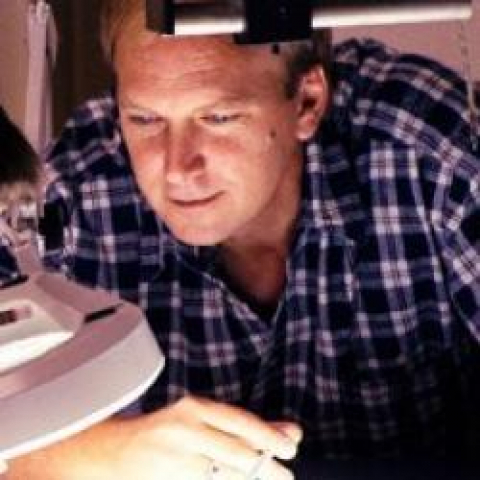David Huff
Professor of Turfgrass Breeding and Genetics

-
210 ASI
University Park, PA - drh15@psu.edu
- 814-863-9805
Research Summary
Population genetics. Plant evolution and ecology. Crop improvement. Physiological tolerance to biotic and abiotic stress.
Huck Affiliations
Links
Most Recent Publications
Het ontwikkelen van straatgras cultivars voor putting greens: de research op Penn State University om het zeer gevarieerde straatgras te temmen
DR Huff, Greenkeeper: vakblad voor greenkeeping on p. 47–49
The genome of Salmacisia buchloëana, the parasitic puppet master pulling strings of sexual phenotypic monstrosities in buffalograss
Christopher Benson, Matthew Sheltra, David Huff, 2024, G3: Genes, Genomes, Genetics on p. jkad238
Chromosome-scale genome assembly of Poa trivialis and population genomics reveal widespread gene flow in a cool-season grass seed production system
Caio A.C.G. Brunharo, Christopher Benson, David Huff, Jesse Lasky, 2024, Plant Direct on p. e575
Homoeologous evolution of the allotetraploid genome of Poa annua L.
Christopher Benson, Matthew Sheltra, Peter Maughan, Eric Jellen, Matthew Robbins, B Bushman, Eric Patterson, Nathan Hall, David Huff, 2023, BMC Genomics on p. 350
Chromosome-Scale Genome Assembly and Annotation of Allotetraploid Annual Bluegrass (Poa annua L.)
Matthew Robbins, B Bushman, David Huff, Christopher Benson, Scott Warnke, Chase Maughan, Eric Jellen, Paul Johnson, Peter Maughan, 2023, Genome Biology and Evolution on p. evac180
Characterization of Subgenomes and Vernalization Genes of Poa Annua and Poa Pratensis By Genome Sequencing and Annotation
Matthew Robbins, Scott Warnke, Peter Maughan, David Huff, Christopher Benson, Erik Jellen, Paul Johnson, Matthew Koch, Robert Harriman, B Bushman, 2022,
Sequenced Genomes of Allotetraploid Poa annua and Its Diploid Progenitors, Poa infirma and Poa supina, Provide Insight into the Evolution of a Versatile Polyploid
Christopher Benson, David Huff, Peter Maughan, Eric Jellen, Shaun Bushman, Matthew Robbins, 2022,
Global DNA methylation predicts epigenetic reprogramming and transgenerational plasticity in Poa annua L
Christopher Benson, Qing Mao, David R. Huff, 2021, Crop Science on p. 3011--3022
A Fully Annotated, High Quality Genomic Sequence of Buffalograss
David Huff, Christopher Benson, Keenan Amundsen, Michael Morikone, 2021,
An Ecological and Evolutionary Genomics Perspective on the Perenniality of Polyploid Annual Bluegrass, Poa annua L.
David Huff, 2021,
Most-Cited Papers
Cool-season grasses: Biology and breeding
Stacy A. Bonos, David R. Huff, 2015, on p. 591-660
Chromosome-Scale Genome Assembly and Annotation of Allotetraploid Annual Bluegrass (Poa annua L.)
Matthew Robbins, B Bushman, David Huff, Christopher Benson, Scott Warnke, Chase Maughan, Eric Jellen, Paul Johnson, Peter Maughan, 2023, Genome Biology and Evolution on p. evac180
Homoeologous evolution of the allotetraploid genome of Poa annua L.
Christopher Benson, Matthew Sheltra, Peter Maughan, Eric Jellen, Matthew Robbins, B Bushman, Eric Patterson, Nathan Hall, David Huff, 2023, BMC Genomics on p. 350
Global DNA methylation predicts epigenetic reprogramming and transgenerational plasticity in Poa annua L
Christopher Benson, Qing Mao, David R. Huff, 2021, Crop Science on p. 3011--3022
Chromosome-scale genome assembly of Poa trivialis and population genomics reveal widespread gene flow in a cool-season grass seed production system
Caio A.C.G. Brunharo, Christopher Benson, David Huff, Jesse Lasky, 2024, Plant Direct on p. e575
Bluegrasses
W. F. Wedin, David R. Huff, 2015, on p. 665-690
Draft Genome sequence of Salmacisia buchloëana (Basidiomycota), which induces hermaphroditism in dioecious buffalograss
David Huff, Tom Hsiang, Ambika Chandra, Yu Zhang, 2017, Genome Announcements on p. 10--1128
Characterizing small RNA profiles in allotetraploid poa annua L. And its diploid parents
Qing Mao, David Huff, 2017, Crop Science on p. S-13-S-25
The genome of Salmacisia buchloëana, the parasitic puppet master pulling strings of sexual phenotypic monstrosities in buffalograss
Christopher Benson, Matthew Sheltra, David Huff, 2024, G3: Genes, Genomes, Genetics on p. jkad238
Development of ent-kaurene oxidase-based conserved intron spanning primers for species identification in the genus poa (poaceae; bluegrass)
Jonathan LaMantia, Ambika Chandra, David Huff, 2018, Agronomy on p. 58
News Articles Featuring David Huff
Apr 19, 2021
Penn State study: Poa annua remembers being mowed
Discovery by Dr. David Huff and research team could lead to seed production for greens.
Full Article
Apr 19, 2021
Plant Biology Students Help Solve Mystery of Turfgrass "Memory"
Poa annua, or annual bluegrass, a turfgrass species commonly found on golf course putting greens around the world, possesses transgenerational memory, “remembering” whether its parent was mowed or not mowed, according to a new study by Penn State researchers.
Full Article